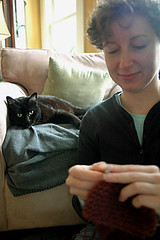I think I’ve figured out one reason writing this book is so tough for me. It’s because I’m wracked by self-doubt.
This self-doubt isn’t new. I’ve been struggling with it for years, and it’s just become more acute since I started Get Rich Slowly. I never set out to be a personal finance expert. In fact, I’m sort of the opposite of an expert. I’m an average guy who’s made a lot of mistakes. Sure, I’ve turned things around and that’s what I blog about, but I struggle with the idea that people expect me to know more than I do (or have more training than I do).
And so every day at Get Rich Slowly, I brace myself for failure. A part of me thinks, “This is the day. Today everyone will realize that I don’t know what I’m talking about, that I’m just a regular joe.” I wake up every morning expecting to find tons of negative comments about whatever it is I’ve written. (Or whatever my guest writers have written.)
For over three years — for over a thousand days — I’ve wrestled with daily doubt.
Kris has tried to talk some sense into me. So has Lauren, my wellness coach. “You don’t claim to be anything but a regular guy,” they say. “Nobody expects you to be an expert.”
Lauren tries to trace my thought process. “Did the blog collapse today? Yesterday? At any time over the past three years? Why should today be any different? How can you look at a thousand days of success and still expect to fail?”
I don’t know, but every day I do. I think that today will be the day that I fail.
“And if you do fail today, so what?” she asks.
Anyhow, the thousand days of doubt at the blog is one beast. I understand it. I know that it rears its ugly head every night before I go to bed, and that I tackle it head on every morning when I check to be sure everything’s okay. It’s a daily cycle — one that I know by heart.
But the book…the book takes this doubt and fear of failure to whole new levels. At least with the blog, I get immediate feedback. If I say something stupid, people let me know. If I stumble on something that resonates with readers, I can see it right away. I’m able to make constant course corrections. Not so with the book.
As I write it, my audience for the manuscript is small: Kris, my editor, two tech reviewers, and occasional folk that I let read a chapter for whatever reason. This is a tiny tiny sample size. And they’re looking at work I did days or weeks (or months!) ago. I have no chance to make course corrections.
And so every day I sit down to write the book, I drown in doubt:
- Does money really bring happiness? What if I have my facts wrong?
- Should I really be defining S.M.A.R.T. goals, or does everybody know them?
- Should I include a detailed budget, or is it okay to cover the general idea?
- Am I giving too much detail about frugality? Not enough?
- What the hell should I write about banking?
It’s true that I’m proud of a few chapters (happiness, which required a lot of research; debt, which summarizes my philosophy on the subject and contains lots of useful resources; income, which came out much better than I’d planned), but I also loathe a few, as well (frugality, which is so damn big!; banking, which started fine, but which seems incoherent to me now).
Every day, my stomach is tied in knots as I start to write. Will I do this subject justice? Have I included enough useful tips for the readers? There’s so much to cover — what if I leave out the wrong stuff?
In the end, I have to trust my editor. She’s been awesome so far, and she provides an excellent sounding board. She puts up with my neurotic angst (as does Kris, who is earning a million wife points through this whole process). And I have to admit to myself:
I’m doing the best I can considering the circumstances.
What more could I possibly do? If my best isn’t good enough, there’s nothing that can be done, right? So, if I’m doing my best, why worry? But I know that tomorrow I’ll wake again filled with doubt.




